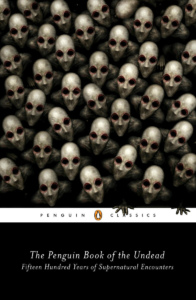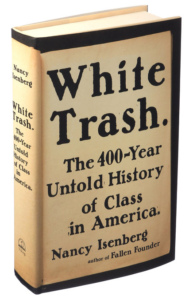News
Book Spotlights
The Penguin Book of the Undead: Fifteen Hundred Years of Supernatural Encounters
Scott G. Bruce CN ’00
 Today’s popular culture is crawling with zombies and vampires. But where did this fascination with ghouls and ghosts begin? Scott G. Bruce CN ’00 explores the history of ghost stories in The Penguin Book of the Undead. Combing through theological texts, personal letters, and passed-down stories, Dr. Bruce traces the many forms that tales of the supernatural have taken over the centuries, from the ancient Roman Empire to the Protestant Reformation.
Today’s popular culture is crawling with zombies and vampires. But where did this fascination with ghouls and ghosts begin? Scott G. Bruce CN ’00 explores the history of ghost stories in The Penguin Book of the Undead. Combing through theological texts, personal letters, and passed-down stories, Dr. Bruce traces the many forms that tales of the supernatural have taken over the centuries, from the ancient Roman Empire to the Protestant Reformation.
“This exceptionally well-curated compilation shows that the wide variety of accounts of the undead have been rampant in literature long before the Gothic era,” says Publishers Weekly. Dr. Bruce “presents the contents with an enthusiasm that makes these . . . works accessible to the casual reader.”
Known and Strange Things
Teju Cole MN ‘00
 In this collection of more than fifty essays, Teju Cole writes on topics like politics, photography, travel, literature, and history. He crisscrosses time and medium, bringing new perspective to art and historical movements, speaking on subjects from Shakespeare to Instagram, W.G. Sebal to Boko Haram.
In this collection of more than fifty essays, Teju Cole writes on topics like politics, photography, travel, literature, and history. He crisscrosses time and medium, bringing new perspective to art and historical movements, speaking on subjects from Shakespeare to Instagram, W.G. Sebal to Boko Haram.
Vanity Fair says of the book: “[Cole] brings a subtle, layered perspective to all he encounters—whether it’s photographs, books, foreign countries, or Internet memes. The collected essays of Known and Strange Things offer a glimpse of a roving mind in action.”
Mr. Cole is the author of Every Day is for the Thief and the PEN Hemingway winner Open City.
White Trash: The 400-Year Untold History of Class in America
Nancy Isenberg CN ‘88
 The American Dream has always promised the people of this country that, if they just work hard enough, they can achieve anything. Nancy Isenberg, however, thinks this idyllic, class-free, land of opportunity is a myth. In her new book, White Trash: The 400-Year Untold History of Class in America, Dr. Isenberg looks at the origins and evolutions of the “useless lubbers,” “crackers,” and “clay-eaters.” From the British cast-offs of colonial America to the rise of eugenics to television shows like the Beverly Hillbillies and Here Comes Honey Boo Boo, White Trash shows just how deeply ingrained this class structure is.
The American Dream has always promised the people of this country that, if they just work hard enough, they can achieve anything. Nancy Isenberg, however, thinks this idyllic, class-free, land of opportunity is a myth. In her new book, White Trash: The 400-Year Untold History of Class in America, Dr. Isenberg looks at the origins and evolutions of the “useless lubbers,” “crackers,” and “clay-eaters.” From the British cast-offs of colonial America to the rise of eugenics to television shows like the Beverly Hillbillies and Here Comes Honey Boo Boo, White Trash shows just how deeply ingrained this class structure is.
The Christian Science Monitor calls the book “a carefully researched indictment of a particularly American species of hypocrisy, and … deeply relevant to the pathologies of contemporary America.” The book spent 11 weeks on the New York Times Best Sellers list for hardcover nonfiction.
##
This story first appeared in the fall/winter 2016 issue of Fellowship, the newsletter of the Woodrow Wilson Foundation. To see the full newsletter, click here. To see your recent publication featured on WW Perspectives, please email Frances Hannan (you must be a recipient of a Fellowship from the Woodrow Wilson Foundation to be featured).

